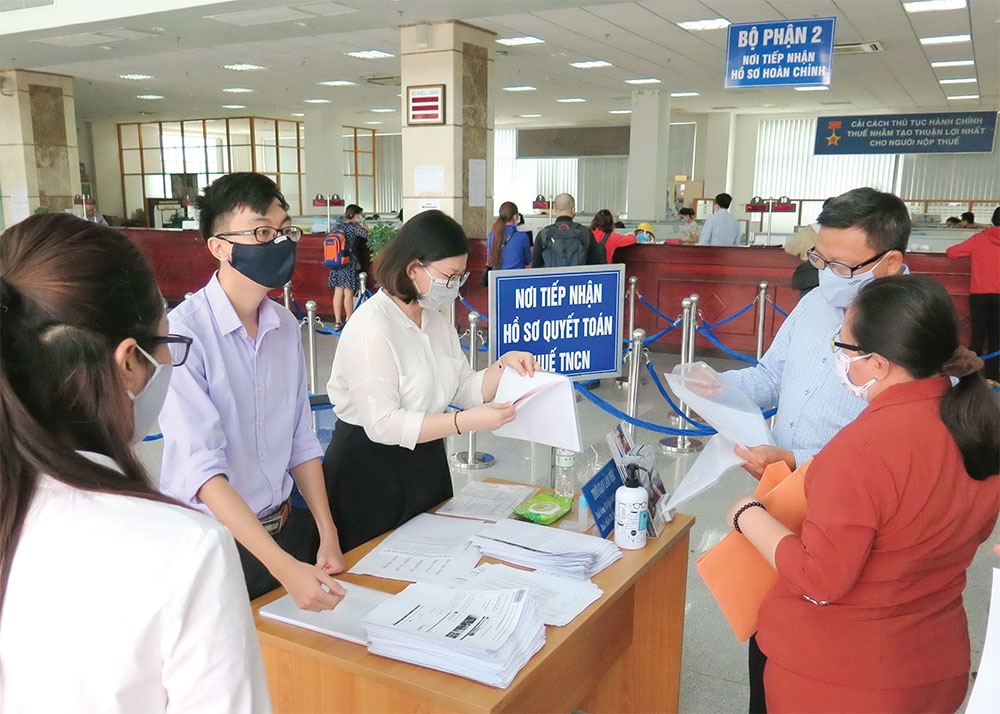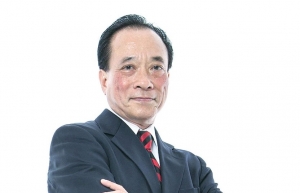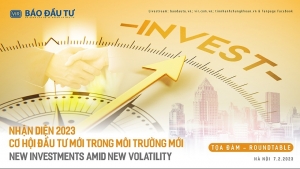Bonfire of red tape to spark smoother business operation
 |
| Greater use of e-approvals will help cut time and costs for many, Le Toan |
At the start of every year, the government often enacts Resolution No.01/NQ-CP on key tasks and solutions for the implementation of socioeconomic development plan and state budget estimates for the year, alongside Resolution No.02/NQ-CP on measures to improve the business environment and enhance national competitiveness.
However, it has become a little bit different this year when on January 6, Prime Minister Pham Minh Chinh signed and promulgated only Resolution No.01/NQ-CP as a combined document, with all such tasks highlighted.
“[The government] will improve the quality of reformation of the portfolio of conditional investment and business professions and business conditions. It will also review and revise conditional business professions and remove out of the portfolio the professions that can be applied in other more effective management solutions,” the resolution stated.
The government will also revise and eliminate business conditions currently stipulated in specialised laws if such conditions are found illegal, unnecessary, infeasible, and unclear, the resolution stressed. In addition, the government will also review and revise all types of practising certificates in order to reduce their number and save costs. The government will also unify, merge, and simplify legal documents in a manner that it will be easy to understand and access, fully ensuring transparency.
“I have talked with many domestic and foreign enterprises and investors, and they keep complaining about our cumbersome administrative procedures. Reforming such procedures is among the key tasks for 2023 with individuals and businesses at the centre,” said PM Chinh at a year-end conference held by the Ministry of Home Affairs in Hanoi a month ago. “It is ordered that all ministries and agencies boost reforms and change their mindset, methodology, and solutions.”
Wider reforms needed
According to business associations in Vietnam, although the government has made great efforts to decrease and simplify many administrative procedures, many regulations are still vexing businesses, investors, and individuals. In many localities and ministries, when a regulation is removed, another more complicated is created, making it more difficult for enterprises to perform.
In a specific case, under the Business Climate Index (BCI) published by the European Chamber of Commerce in Vietnam (EuroCham) in mid-January and produced by YouGov Decision Lab, European business stakeholders’ perception of Vietnam’s business climate fell to 48 points in Q4 of 2022. This was a drop of 14.2 points compared to three months ago and 25 points from Q1 of 2023.
The BCI, conducted over EuroCham’s 1,300 members in Vietnam, found that the three most significant regulatory barriers to foreign companies operating in Vietnam were identified as a lack of clarity regarding rules and regulations (51 per cent), administrative issues (41 per cent), and visa and work permit difficulties (30 per cent).
However, despite these difficulties, 58 per cent of BCI respondents were satisfied with the attention policymakers pay to business needs when setting relevant policies.
In terms of what Vietnam should do to improve its foreign direct investment attraction prowess, reducing administrative difficulties (70 per cent) retained the top spot. This has been the case since this question was first raised with BCI respondents in the second quarter of 2022. Meanwhile, the issue of reducing visa difficulties for foreign experts has become increasingly pertinent, increasing 8 points from Q3 to Q4.
Adam Sitkoff, executive director of the American Chamber of Commerce in Hanoi once told VIR, “We believe the most important factor for a favourable investment climate is a fair, predictable, and streamlined regulatory environment that values innovation, not only to attract new investment, but also to maintain and grow the investment already here.”
“Facilitating prompt approvals of business licences and investments, including unfreezing real estate development, is key. Greater use of e-government and e-approvals would also be a big step forward. There is no doubt that existing investors expanding operations is the best advertisement to attract new investment,” Sitkoff added.
According to Sitkoff, US companies and investors support efforts to create a modern economy that will attract future investment and high-paying jobs for Vietnamese people.
“For Vietnam to be successful, non-productive red tape must be controlled and the country’s regulatory framework must be stable and predictable. AmCham members remain concerned with changes in policy and regulations which are inconsistent with international best practices – frequently seen in the digital economy space, for example,” Sitkoff said.
Senior economist Raymond Mallon also told VIR that to help individuals, investors, and businesses perform more effectively, the Vietnamese government would need to take more drastic actions. He pointed out some barriers that must be removed as soon as possible. “Complexity and lack of transparency in markets for land use create inefficiencies and opportunities for corruption. Reforms should aim for stronger and more transparent systems for property rights protection, including contract enforcement and economic courts,” he said.
Stronger regulators that are independent of commercial interests are needed to enforce competition policy, to ensure standards (for example for health, education, and safety), and to oversee network industries (transport, power, and communications).
“Strengthened corporate governance will be critical for sustainable capital market development. Strong and independent economic regulators – for example, for the capital market, competition policy and consumer protection, energy, and telecoms – can help to better protect individual and property rights and the environment, and to strengthen transparency, corporate governance, and accountability,” Mallon stressed.
Waves of adjustments
Administrative reforms have been underscored in the government’s almost all policies and programmes over the past decades. However, such reforms have become a must since 2016, with three large-scale administrative reform waves.
The first one, from 2007 to 2011, witnessed the review and promulgation of mover 6,000 procedures, with an average decrease of $1.6 billion per year in cost for abiding by these procedures.
The second wave, taking place during 2016 to August 2020, saw the removal and simplification of nearly 3,900 out of 6,200 business conditions; and 4,400 out of 5,400 business procedures. Additionally, the government also reformed regulations of specialised inspection for 6,780 out of 9,900 lines of goods, saving $260 million per year. Moreover, more than 1,400 administrative procedures were introduced in the National Public Service Portal, saving about $291.3 billion annually.
Since August 2020, Vietnam has been deploying the third wave of administrative reform under Resolution 02 and Resolution No.68/NQ-CP on issuing a programme on abolishing and simplifying business regulations by 2025. This is the most comprehensive administrative procedure reform in the history, expected to help enterprises and the public to annually save multi-billion US dollars, according to the Government Office.
The government has set out many major solutions such as annually implementing the plan on cutting and simplifying regulations related to the business activities; regularly updating regulations related to business activities that are amended, supplemented, replaced, and abolished; and receiving, collecting and summarising all enterprises and people’s feedbacks, recommendations and opinions on unreasonable regulations.
According to the Steering Committee of Administrative Reform, over 1,041 business regulations in 101 documents have been removed and simplified, while schemes were adopted on reducing and simplifying nearly 1,000 regulations, and amending and supplementing over 200 legal documents on state management of seven ministries. This year, the government “will continue studying, amending, and supplementing regulations on specialised inspection on export-import goods in which there will be a reduction in the goods portfolios, while fully applying principles on risk management and supplementing the portfolio of items exempted from specialised inspection,” said Resolution 01 of 2023.
Imported items in small volume for internal use, especially those that have been highly standardised, will be exempted from specialised inspection, it added. In addition, the government will strictly correct all inspection plans and activities in order not to affect enterprises’ performance.
 | Gauging efficient investment channels for the year Looking back on 2022, right from the outset of the year, the economy rebooted strongly, reflected in economic growth data and banks’ lending practice. Yet by the end of the year, there were signs growth slowing due to the impacts from external and internal factors on the economy. |
 | VIR to host 'New Investments amid New Volatility' roundtable VIR is proud to host the roundtable titled 'New Investments amid New Volatility' at the headquarters in Hanoi on February 7. |
What the stars mean:
★ Poor ★ ★ Promising ★★★ Good ★★★★ Very good ★★★★★ Exceptional
Related Contents
Latest News
More News
- Legalities to early operations for Vietnam’s IFC (February 11, 2026 | 12:17)
- ASEAN unveils digital outlook, AI readiness research (February 11, 2026 | 11:52)
- Norfund invests $4 million in Vietnam plastics recycling (February 11, 2026 | 11:51)
- Oil and gas sector sees renewed momentum (February 11, 2026 | 11:45)
- Siam Cement Group announces 2025 results amid global headwinds (February 11, 2026 | 11:44)
- Rising consumption and travel fuel ‘Tet season’ stocks (February 11, 2026 | 11:43)
- Vietnam financial markets on the rise amid tailwinds (February 11, 2026 | 11:41)
- Construction firms poised for growth on public investment and capital market support (February 11, 2026 | 11:38)
- Education as strategic capital: why Dwight School Hanoi represents a long-term investment in Vietnam’s future (February 10, 2026 | 19:00)
- Vietnam’s financial sector accelerates AI adoption, but security issue remains (February 10, 2026 | 15:37)

 Tag:
Tag:




















 Mobile Version
Mobile Version